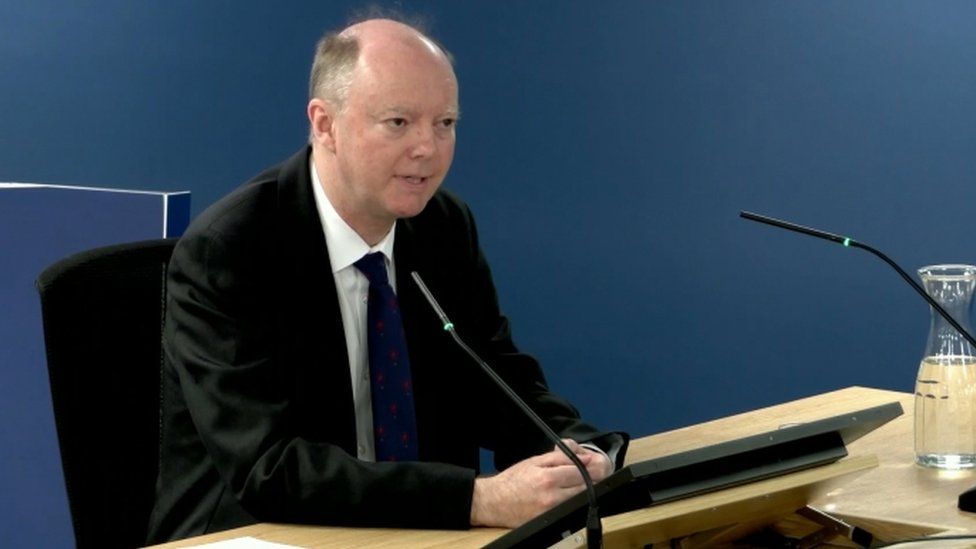ARTICLE AD BOX
 Image source, PA Media
Image source, PA Media
Prof Sir Chris Whitty told the inquiry that he would have banned mass gatherings earlier, in hindsight, in March 2020
By Nick Triggle, Aurelia Foster and Jim Reed
BBC News
England's chief medical officer Professor Sir Chris Whitty has told the Covid inquiry that the first lockdown in March 2020 was imposed "a bit too late".
But he said the government had "no good options" at the time.
Public health issues - such as loneliness, depression and the risk of aggravating poverty - meant it was important to be cautious, he said.
It meant there was a risk of going too early as well as going too late.
Sir Chris also conceded he would do other things differently in hindsight, as the coronavirus was just beginning to spread in early March.
- Banning mass gatherings, such as football matches, sooner
- Introducing quarantine for travellers from China earlier than happened
It came after former chief scientific adviser Sir Patrick Vallance said on Monday that he and Sir Chris did not always see eye-to-eye.
Both men have pointed out debate was helpful - and Sir Chris said, as he had responsibility for public health, it was essential he considered the indirect costs of imposing restrictions on the population.
Sir Chris said differences between them were actually "extremely small".
'Biggest impacts'
He added: "My view is, with the benefit of hindsight, we went a bit too late on the first wave.
"I was probably further towards, 'let's think through the disadvantages here before we act' and also in making sure that in giving my advice, that ministers were aware of both sides of the equation.
"The biggest impacts of those would be areas of deprivation and those in difficulties, and those living alone and so on," Sir Chris said.
"So, I was very aware that we essentially had two different things we were trying to balance- the risk of going too early, in which case you get all the damages from this with actually fairly minimal impact on the epidemic, and the risk of going too late, in which case you get all the problems of the pandemic running away."
And he said: "Even at the height of the pandemic, more people died of causes not Covid than died of Covid," he said. "Every one of those deaths is tragic on both of those sides."
Sir Chris also went on to defend not raising the alarm across government in mid-January 2020, despite his deputy, Sir Jonathan Van-Tam, warning that a pandemic was imminent.
In extracts from his witness statement read to the inquiry, Sir Jonathan said he became "seriously concerned" about Covid on 16 January 2020.
The former deputy chief medical officer said it was clear human-to-human transmission was occurring and "my view was that this would be a significant pandemic".
Sir Chris told the inquiry that Sir Jonathan was being instinctive - and it would have been quite a "narrow basis on which to make quite big decisions".
"If you consistently go to all of government and say, 'I have no data on this, and I'm a bit worried, but my gut feeling is this is going bad', you don't get very much traction," Sir Chris told the inquiry.
Distinct styles
Sir Chris also said the claims by government that they were "following the science" became a "millstone around our necks".
He said he never told ministers what to do over things like lockdown timings. Instead, his role and that of others was to advise ministers of the consequences of taking or not taking certain decisions.
He said ministers had many different things to balance and it was right that democratically-elected politicians took those decisions as there were "no good choices".
In other evidence, Sir Chris was asked if Boris Johnson had a difficulty in reaching clear, consistent positions.
Sir Chris replied: "I think that the way that Mr Johnson took decisions was unique to him.
"He has quite a distinct style but I think lots of other people have got quite distinct styles."
He said the then-prime minister tended to be most focussed in small groups and came to positions through informal conversations, giving the examples of conversations he had with Mr Johnson ahead of TV press conferences.
"It allowed him to test out ideas, not in public, which I think he valued and I think helped the decision-making process," Sir Chris said.
Mass gatherings
Asked about the first cases of Covid emerging in Wuhan in January 2020, he said that the UK didn't "consider enough" the possibility of mandatory quarantine for all travellers arriving from China.
He suggested closing borders or stopping flights might have been a step too far politically.
But telling arrivals, even those without symptoms, they would have to isolate at home for 10 or 14 days could have been considered.
As it was, the UK did not introduce quarantine for travellers from Wuhan until 25 February 2020.
Other countries introduced measures much earlier.
Sir Chris said, in reality, this measure would not have made much difference at the time.
Genetic testing showed the vast majority of Covid infections were spread not by Chinese travellers, but by British tourists coming back from half-term holidays in mainland Europe in mid-February.
But he also said tougher quarantine measures should be an option for the authorities to consider in any future outbreak.
On banning mass gatherings, Sir Chris said the reasoning for not doing that in February and early March 2020 was there was "no good evidence" it would have a material effect on the spread of the virus.
If you stop people attending football matches, they could just swamp pubs, he indicated.
But he said in hindsight he would recommend doing things differently because of the message of normality it sent to the public.

 1 year ago
32
1 year ago
32








 English (US) ·
English (US) ·